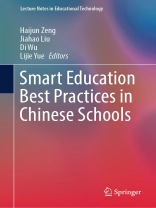This book presents 28 practical case studies in detail and 49 case studies in brief. The collection of these case studies focuses on one or more aspects of exploration and practice on the following topics: smart campus and smart classroom, resource construction and sharing, new teaching mode, comprehensive quality evaluation of students, teacher professional development, application of teaching platform and tool, innovative application of online learning space, collaborative education, and school management and services. The selection and evaluation criteria of the case studies on school practice mainly include concept and implementation, effectiveness and characteristics, innovation and demonstration, and expression and structure. This book helps readers gain a rich understanding of the diverse innovative implementation of smart education in Chinese schools and inspires smart education development in schools in other countries.
Table des matières
Smart Education Towards The Futures of School.- Construction of Future School based on Smart Space.- The Construction of Smart Campus under the Linkage of CIO System.- Cloud School: Practice and Thinking of the New Pattern of Smart Education.- Selected Practices briefs on Smart Campus and Smart Classroom.- Practice of Calligraphy and Aesthetic Education Courses in the ‘Internet +’ Environment.- Taking the Same Class’ with Teachers and Students in Rural Areas.- Teaching Artificial Intelligence to ‘Rural Children’: the ‘Qingyun Primary School’s Practice’ of Artificial Intelligence in Education in Rural Primary Schools.- Selected Practices briefs on Resource Construction and Sharing.- Implementation Path: AI-driven Data Collection of Exercise Load in Primary Schools.- Exploration of Digital Transformation Promotes the Transformation of Teaching Methods.- Promoting the Normalized Teaching Application of Virtual Experiments in Middle Schools.- Thematic Project-based Learning of the’San Xian’ Education Function from the Perspective of Smart Education.- ‘Online-Merge-Offline’ Teaching Mode Boosts Students’ Independent Learning Ability.- Research on Teaching Strategies of Screen-free Programming for Children to Cultivate Computational Thinking.
A propos de l’auteur
Dr Haijun Zeng, Ph.D., is Vice Dean of the Smart Learning Institute of Beijing Normal University, China, Deputy Director of the Educational Informatization Strategy Research Base (Beijing) of the Ministry of Education, and Deputy Director of the National Engineering Research Center of Cyberlearning and Intelligent Technology. His main research interests are online education and Digital Learning Support (DLS) service system.
Jiahao Liu is a Ph.D. student at the School of Educational Technology at Beijing Normal University, China. His main research interests include smart education, social experiment, and digital learning capacity.
Dr Di Wu is Member of the Expert Group on Education Informatization, Ministry of Education, China. He is Professor of the Faculty of Artificial Intelligence Education (FOAIE) at Central China Normal University, Vice Director of the National Engineering Research Center for E-Learning, Vice Director of the National Engineering Research Center of Educational Big Data, and Managing Director of the Educational Informatization Strategy Research Base (Central China), Ministry of Education, China. He has mainly engaged in the research on planning and evaluating education informatization development, and monitoring and evaluating teacher and student digital literacy.
Lijie Yue is Research Assistant at the Smart Learning Institute at Beijing Normal University, China, and at the National Engineering Research Center of Cyberlearning and Intelligent Technology. Her main research interests are smart education and information teaching applications.












